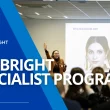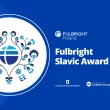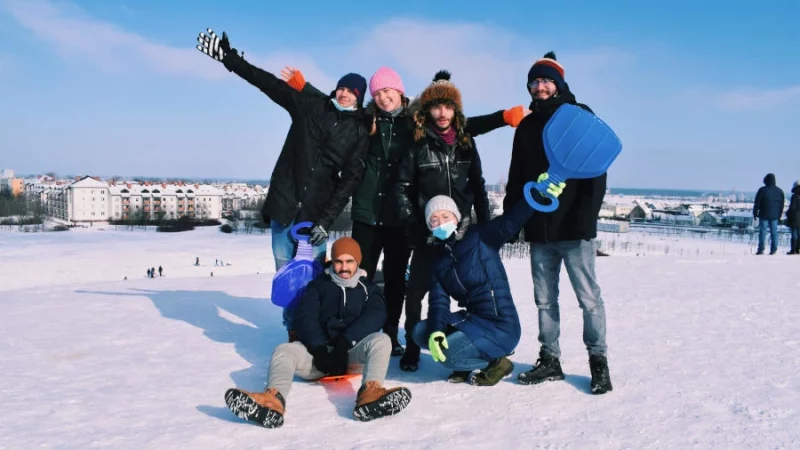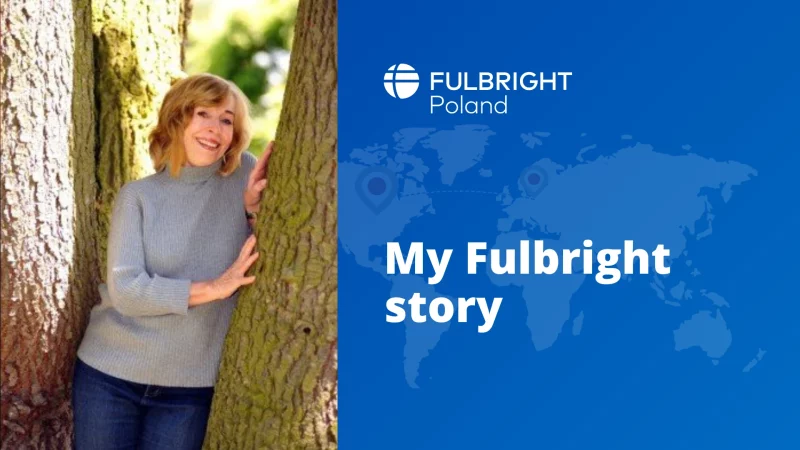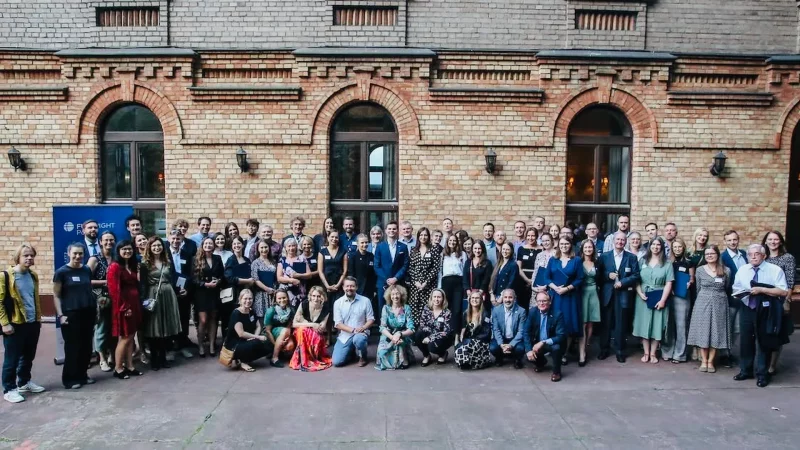Julia Dickenson is currently the only Fulbright U.S. grantee who was able to return to Poland on a grant renewal in 2020. Julia is an English Teaching Assistant (ETA) at the University of Opole where she teaches English at the Institute of Environmental Engineering and Biotechnology as well as at the Interdisciplinary Lab for Social Space and Art. She is also a guest English teacher at a local high school. Julia has recently been interviewed by one of her high-school students, Wiktoria Przeliorz. We encourage you to read this interview to learn more about Julia’s work and her Fulbright experience in Poland.
On December 4th, I had the pleasure to conduct an interview with Julia Dickenson. Julia is an American living in Opole. We met in October 2019 because of Ms. Alicja Wujec-Kaczmarek who is my high-school English teacher. At that time, Julia was a university student and she was coming to our classes to teach us about English language and American culture. It was a good time to learn something new and also importantly, to practise our English but I am not here to write about this but write about Julia – an American woman living in Poland.
Julia is from Nashville, located in the state of Tennessee. She came to Poland in August 2019 after graduating from college with a degree in biology and psychology. When she goes back to the US, she plans to go to medical school. When I heard that, the first thing that came to my mind was, “It sounds hard,” only because I am a very linguistic-oriented person and these plans sound impossible to me. I asked Julia what she is doing in Poland to which she responded “I am teaching English and also this year while I am here, my friends are trying to teach me some Polish, so test me later.”
When I asked her how she found out about Poland and why she decided to come here, Julia said that in the final year of her bachelor’s program, she started to look into some different education-related options for a sort of a “gap year” that involved living outside of the US. Julia got interested in teaching and education during her undergraduate studies, when she taught a course for the medical school admissions test to students who wanted to apply to medical school. She was teaching subjects such as biology, psychology, as well as physics and critical reading skills. All this led her to the Fulbright Program. She applied to Poland because the application requirements specified that they were looking for people with a science background to teach at the university level plus Poland seemed to have a great geographical location and interesting history and culture. “I didn’t know too much about Poland until I got here and learned firsthand. But now I love this place and it’s like a second home to me,” Julia said.
Wiktoria Przeliorz: “Did you have any concerns about coming here?”
Julia Dickenson: “My main concerns were mostly related to language barriers. I had had international experience before, but in Spanish-speaking countries, which is a much more familiar language to me than Polish. But I quickly learned that it isn’t a problem in most situations, both because a lot of people here speak English and I was able to find some really amazing people from Opole who were willing to help me when I needed it! Those people, as well as many others from Poland and from international countries, are the best part about living in Poland. I have met so many amazing and intelligent people here. I find the people of Poland to be, by and large, very hospitable, interesting, and passionate about a variety of subjects. The one downside for me to living in Poland is the huge separation from my own family and friends back in the US, but with the popularity of video calls and online communication, I’ve found it to be bearable.”
WP: “It is lovely to hear that Polish people are always willing to help. So, are you the only foreigner in your dormitory?”
JD: “I live on the 1st floor where there are a couple of dorms for faculty and teachers. Nobody else is here now. Everything is online so that’s why nobody is here and I don’t have any neighbors but I know that people who normally live here are Ukrainian and mostly foreign students e.g., from Spain, Italy and Brazil.”
WP: “Do you like being in Poland?”
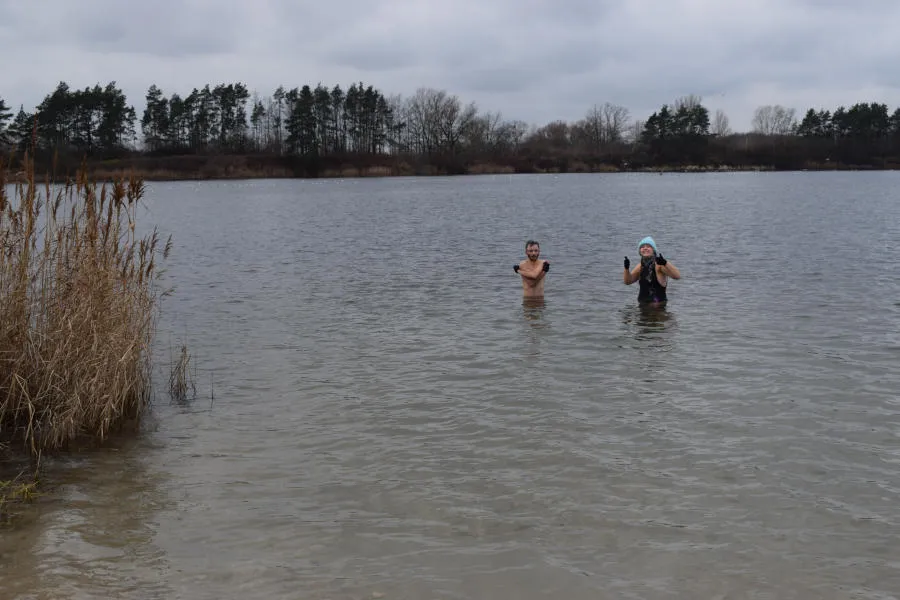
JD: “Yes! I really like being here. That’s why I ended up coming back after I had to leave because of the pandemic in March, since my program was cancelled. I returned and I decided to go to medical school another year.”
WP: “Would you like to stay here in the future or would you think of going somewhere else?”
JD: ‘Honestly, I probably would like to be here for a while but not to live. I think about medicine seriously and I also think it is kind of hard to change your career between different countries. I reckon I will probably stay in the US but I think maybe I would consider living somewhere else, maybe not here because I think trying to experience new things is important as well. However, I definitely would come back to visit friends and see new places.”
WP: “As you said earlier you had to go back to the US in March. How was the beginning of the pandemic for you?”
JD: “I left on March 19th, so I was only here for a couple of weeks when that was happening, but it felt like forever. Every single day, we were getting emails with news and updates. In the morning, noon, afternoon and evening, there were always some changes, and I really didn’t know what to do. This situation was just very confusing. Our program was constantly sending emails about the pandemic and we were trying to figure out what will happen on our own, so it was a very interesting time. It felt like months but it was only 2 weeks.”
WP: “Were you stressed?”
JD: “At the beginning I was definitely stressed, especially because nobody knew what the virus actually was and how it would affect us, so it was an unexpected stress. Later I wasn’t obsessed with the news anymore and stuff like this but I feel I always had a low level of stress. In general, that situation contributed to more different emotional states and I feel like I have had more ups and downs than ever before. Even if I was not constantly thinking about the pandemic, I was always scared at a low level.”
WP: “Now we can easily see that the pandemic affected our mental health. Some coped with this, others became more depressed, that’s why these days it is really important to remember to take care of oneself. When you came back to the US what have you been doing? How did you feel?”
JD: “It was a good 7 months when I was home but the first month or two, I wasn’t doing very well and I wasn’t very happy when I heard I had to come back from Poland. But I was reading, playing with dogs and stuff like that to distract my thoughts. I was also thinking about what I should do for a job for the summer. I was working with professors but I couldn’t teach because of the time difference. I wasn’t teaching but I was still working on my doc and then I ended up getting a job in a doctor’s office and from May to September I was doing clinical research.
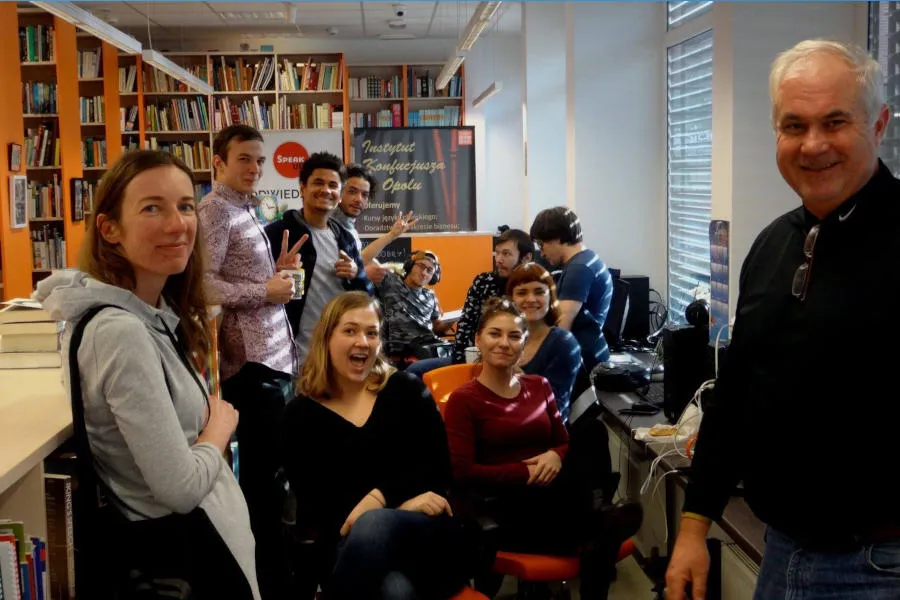
WP: “What clinical research?
JD: ”I was working with a doctor who is a neurologist and he has patients who have multiple sclerosis. We were working on a project where we were taking the level of immunoglobulins in their blood to figure out their immune problems. Their problems with the immune system are related to drugs they take for the disease. We tried to figure out if their immune system gets worse or better with certain drugs. It was a lot of typing in data.”
WP: “You have always been interested in biology?”
JD: “Only when I started college. I didn’t really take biology in high school, only in one class when I was 15. But I loved taking biology classes in college and I really enjoyed it. Also, when I started taking biology, I realized that I would like to study medicine. The reason I took psychology was not really because I had to but I was interested in it earlier and I took it because I had time.
WP: “So, what specialization would you like to focus on in medicine?”
JD: “I’m not sure yet. Our system is a little bit different than the Polish one and you don’t have to pick your specialization until your 3rd year. But I love to work with kids, so I think something in pediatrics. That is probably what I would like to do.”
WP: “Going further, how is the situation in the US with COVID-19?”
JD: “It is not super great right now; we are still number 1 for COVID-19 cases. I think it also is hard for the US because we don’t have a centralized government and states have a lot of their own autonomy, they can do what they want, so some states are living with lockdowns, some are doing very well, and some states are ignoring the situation. That brings down the people who are doing well. So, I think it has been hard to figure out some solution because the government right now is not going to tell states what to do, they can do it by themselves. That created some chaos. It’s also confusing if you’re going between states. It’s basically like going around different countries. You don’t know when they will close the borders, because the state borders are not parted. You can travel and they can close you. My state is not doing super well. I had COVID-19 when I was at home, because of this, and they said to wear masks and other stuff but still it is very contagious when you go to the grocery store.”
WP: “How did you feel when you had COVID-19?”
JD: “I got a sore throat, so I thought it was some kind of a cold but just in case, since I worked in a doctor ‘s office with patients who take drugs that suppress their immune system, I needed to take the test. I told my boss and he said it is probably only a cold and not COVID-19. I got tested and they said ‘oh it does not look like it is COVID-19’ but the test came out positive. I got a sore throat and I ended up getting a fever. I was tired but I didn’t have any of those basic symptoms. I only lost my sense of smell but I had the taste. My case was pretty mild and it lasted for only about a week.”
WP: “Do you think in Poland we are doing well with COVID-19? Do you think it is better than in the USA?”
JD: “I think definitely no, some of the restrictions here don’t make any sense. Random things are closed and other things are open. It is very confusing. In general, I think it is better organized because you have one centralized government control, but I’m not saying either of the two countries is doing great.”
WP: “Did you have any problems with coming back to Poland?”
JD: “I think it was not too bad. First, I needed to go to Washington, DC to get the visa – even during the pandemic I needed to go to a different state. It’s a 12-hour car ride and I was lucky that a friend of mine drove me there. Once I got my visa, I boarded a plane to Warsaw 2 weeks later. When I went to the airport, I was questioned a lot about whether I was living in Poland or why I was trying to go there because we were the only people who could come back. They asked questions such as whether I have any Polish heritage etc. But I had a visa so they had to let me in although they were really skeptical. I had to wear masks, do social distancing, etc. All of the 3 flights I took were super empty because not many people were travelling at the time and airports were empty so social distancing was not hard.”
WP: “When you are in Poland, do you miss your family?”
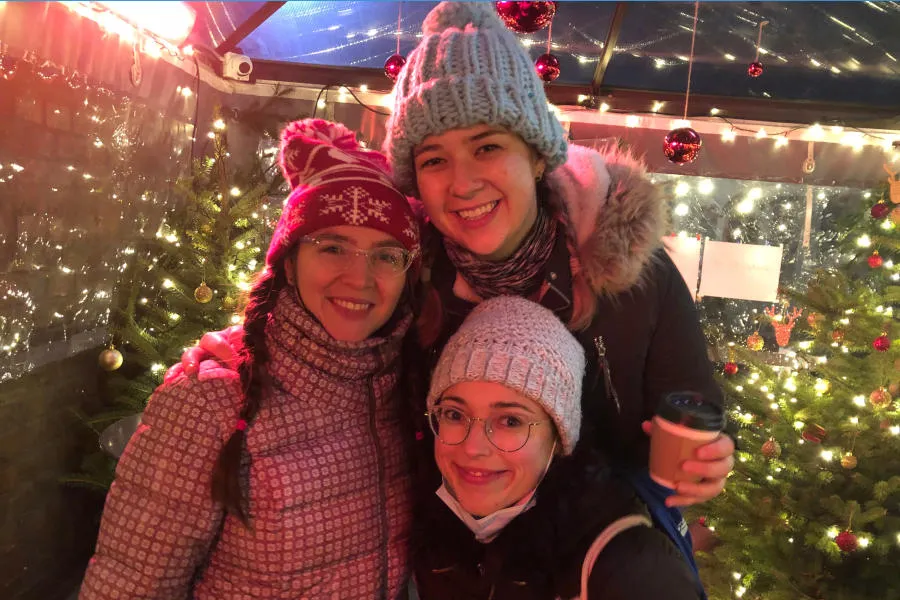
JD: “Actually, on an everyday basis I’m not really thinking about this so much, because I was able to spend 7 months at home. I was never expecting after university to come back home for more than 2 months. That was a big surprise. It was a hard thing to do. Then, once I got home, I enjoyed being with my family. I have gotten a lot of family time this year. I’m okay, but what I missed the most was spending Thanksgiving with my family. It is almost as big a holiday as Christmas is in Poland. All my family was together, they were cooking etc. and it was hard to think that they were doing all this without me. But we had a family zoom call. I wish I was home at the time, same with Christmas. So, I cope with it by facetiming, zoom calls, texting… This whole COVID-19 makes people use more technology. I can’t even imagine what it would be like without technology and how would we stay in touch with people.
WP: “Have you ever been in a bad situation while being here?”
JD: “Of course, I have. Now, when I think about it I can only think of some misunderstandings caused by me not knowing Polish. For instance, in my dorm there is one cleaning lady who likes to yell at me in Polish even though she knows that I don’t understand the language. Yet, she keeps doing that because I forgot to clean the dorm, close the dorm, I left something in the kitchen etc. In general, I experienced some unpleasantness but nothing very crazy.”
WP: “My last question is: What do you think about Polish people?”
JD: “I absolutely love Polish people. They are very honest, polite and graceful. People that I met are like my family and friends. People are often very fake in general but Polish people are always real. Every time I am in somebody’s home, I feel loved. People try to make me feel like I am a part of their family, which is super nice. Everybody that I met here, especially in these hard times, was trying very much to help me. This is amazing.”
The last thing we talked about was how Julia is trying to learn Polish. We had fun as we tried some tongue twisters in both Polish and English. I also asked Julia what she had learned recently. She said that Polish is very hard and that one of the most important phrases for her is: “Co się dzieje?” (“What’s going on?”) and that despite some difficulties, she is trying to learn Polish vocabulary and grammar. I also asked her to describe Poland in 3 words to which she replied: “understated beauty and pragmatic.” She finds Polish people to be practical, sensible, and down-to-earth.
It was an amazing experience and pleasure to conduct this interview. It helped me a lot with communication and writing skills. Julia’s experience also made me aware that we should never stay still but look for different experiences, places and feelings.
Written by Wiktoria Przeliorz



